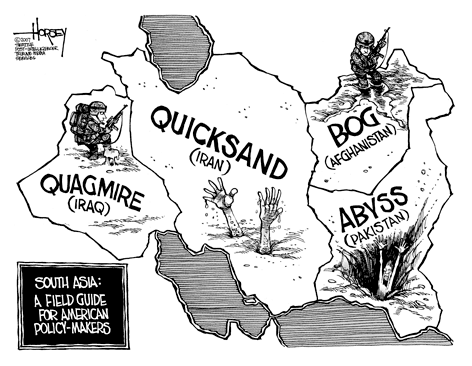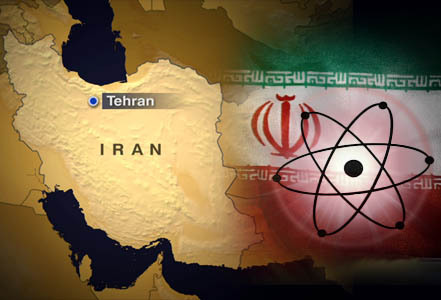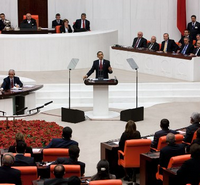
WAPO story.
A year ago, Iran was on its way to becoming a pariah state. Dozens of governments accused Iranian leaders of stealing the presidential election and condemned the brutal crackdown on protesters that followed. The country faced sanctions and international scorn over its controversial nuclear program.
Now, even as the U.N. Security Council prepares to impose its fourth round of sanctions on Iran with a vote slated for Wednesday, Tehran is demonstrating remarkable resilience, insulating some of its most crucial industries from U.S.-backed financial restrictions and building a formidable diplomatic network that should help it withstand some of the pressure from the West. Iranian leaders are meeting politicians in world capitals from Tokyo to Brussels. They are also signing game-changing energy deals, increasing their economic self-sufficiency and even gaining seats on international bodies.
Iran's ability to navigate such a perilous diplomatic course, analysts say, reflects both Iranian savvy and U.S. shortcomings as up-and-coming global players attempt to challenge U.S. supremacy, and look to Iran as a useful instrument.
Honestly, the first word out of my mouth at reading the opening paras of the piece was "bullshit"--at least regarding the line of America's "shortcomings as up-and-coming global players attempt to challenge U.S. supremacy, and look to Iran as a useful instrument."
I do think the Iranians are savvy, and that we shoot ourselves in the foot every time we reduce them to some caricature of irrational religious nutcases. I see Ahmadinejad as a very clever fellow, who piously led his Revolutionary Guards right into a successful and impressively bloodless military putsch, effectively giving the president his goal of a party-based dictatorship that supplants the theocracy in too many ways to count. His veterans of the Iran-Iraq war feel they've earned their dictatorship, and all the economic earnings that go with it. In that way, they remind me plenty of Brezhnev's grubby, unimaginative crew. And like Brezhnev's bunch, they know full well that getting nuclear weapons is a huge credentializing signpost.
I stipulate all that.
I also stipulate that rising great powers, when forced to by our singular obsession with nukes, will take advantage of Iran's equally laser-like focus on nuclear weapons. But none of these powers want Iran in that position, don't kid yourselves, because it does nothing for them and rising great powers tend to be about as unsentimental and ungenerous as they come about potential rivals.
What drives this whole show more than anything else is our insistence that damn near everything in our foreign policy agenda take a back seat to the all-crucial goal of preventing that which will not be prevented. We made/make our effort in Iraq take a backseat to it. Ditto for Afghanistan. Ditto for our lackluster attempts in recent years to do anything about the Palestinians. We hold a good chunk of our relationships with a host of crucial rising great powers hostage to this dynamic--all of this to no avail.
In the end, we'll be forced down the path that was always there: we'll simply greet Iran's achievement with a clear promise to liquidate the entire place if they ever choose to be so stupid as to launch one of those missiles or expect that some bomb passed to others will not be traced back to them.
And then we let those jackasses live with their "amazing, world-changing achievement" that will earn them nothing.
Or we can continue pretending that all this effort has real meaning and impact, when neither is true.
I've said it before and I will repeat it endlessly: there is nothing magical or unprecedented about a "Shiite bomb." They work like all the rest. We have the only history of using them.
We shouldn't forget that now, much less go all wobbly over such a peon power. If Russia was revealed by history and globalization as just Upper Volta with nukes, what exactly does that make Iran?
And don't tell me the oil and gas make it different, or the religious ideology. This is all about power; when we imagine otherwise we insult everybody's intelligence.
 Monday, April 2, 2012 at 9:39AM
Monday, April 2, 2012 at 9:39AM Given this administration’s resurging plans for regional missile defense schemes in both Europe and Asia, President Barack Obama’s recent open-mike admission to Russian President Dmitry Medvedev that he will have more freedom in his national security decision-making once he wins re-election is not a comforting thought. For a guy who promises “a world without nuclear weapons,” Obama seems awfully intent on incentivizing both Russia and China to field some more.

 China,
China,  Iran,
Iran,  US Military,
US Military,  nuclear weapons,
nuclear weapons,  technology | in
technology | in  WPR Column |
WPR Column |  Email Article |
Email Article |  Permalink |
Permalink |  Print Article
Print Article 





























